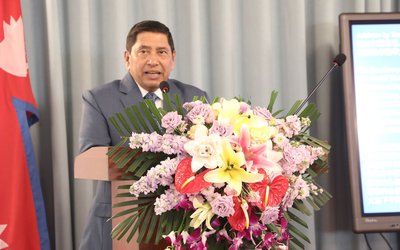Who are Women Human Rights Defenders? What are they doing? Where? Are they facing challenges now? Will they face them in the long run? Who are responsible to speak for them? These questions need to be recognized and answered.
Women Human Rights Defenders (WHRDs) are activists who raise voices against violation of human rights. Their history begins with Yogmaya and continues till date. However, on behalf of various civil society organizations, WHRDs have been working more systematically since the time of Maoist insurgency. They are distinguished from Female Community Health Volunteers (FCHVs) and women associated with paralegal committees by their roles and responsibilities.
Usually, WHRDs gather information, investigate and report on violations of human rights as they know them in line with their Terms of Reference (ToR). They may also go beyond that because; i) the scope of human rights is very wide. So, they are heavily engaged in protecting, promoting and exercising the civil, social, cultural, political and economical right of women, men and transgender groups. They belong to activists groups of all kinds, child right, women right, domestic violence, disputes/conflict, land right, property right, food right, sexual and reproductive right, disability right, right of minority groups, rape, torture, discrimination, enforced disappearance, extortions, dalit right, minority rights etc ii) the rights, roles, responsibilities, and places are also gendered, iii) they always stand against violence of any form, iv) they are easily available as volunteers, v) they represent the same caste, class,region, religion (mostly at the local level), vii) they are recognized by the community, vii) they organize themselves in networks and federations and viii) they always stand at risks, and challenges beyond the comfort zones etc. They are now working across the country under various organizational hats of political parties and professions, e.g. independent journalists.
Unfortunately, their human rights are violated by political leaders, perpetrators and sometimes by government service providers, including police, chief district officers, and village secretaries etc. Their risks and threats range from unnecessary accusation, character assassination, sexual harassment, court cases, family/social exclusion, and telephonic threats for kidnapping to death as well.
In this situation, WHRDs are facing the following major challenges; i) work overload, their work starts since early in the morning and they also have to wake up at mid night e.g. when the incidence or violence happens. By experience, violence occurs during festival and planting season, so WHRDs are unable to give time to their own business, ii) multiple hats, they lose the identity or support during crisis and are used as guided by facilitation/funding agency, iii) economically poor or dependent on their family members, so they are always in stress for managing daily stuff such as their travel, communication expenses, iv) having inadequate skills and knowledge on ongoing changes in policies, guidelines, technology, language etc.
Thus, regardless of the hats of WHRDs and their facilitating agencies,WHRDs are suffering injustice themselves or exploited by the facilitating agencies. Most of WHRDs come from the poor and marginalized communities. Emotionally, they are down to earth and work with their minds and hearts for emancipation from injustice, discrimination and violence of all forms. But none of the system is taking care of them and their future. They are mobilized as project based activities in the beginning, later the activism starts, because, they are neither able to keep silent nor the community leaves them.
Thus, WHRDs work for ever to protect, promote and respect human
rights, but their own human rights are always undermined. Their identity and efforts are highlighted occasionally and limited within the day’s celebrations.
To this end, the following points should be carried out seriously; i) avoid multiple hats, naming and faming. Because most of WHRDs or activists or human rights workers are doing similar jobs or they are totally different from Female Community Health Volunteers and Paralegal women. Funding agencies should come up with single working modality or strategy as well as making them accountable towards success as well as challenges. They have to clearly mention their organizational position in case of risks and threats. Naming and faming is not the concern of WHRDs especially at local level, ii) ensure the system for economic independence, including provisions of the identity card, insurance, provident fund or any scheme for them, iii) capacity building of WHRDs as their interest, capacity and aspirations. Think more loudly in terms of sustainability of these skills and knowledge including training on report writing, computer training, proposal writing, language etc
email:rpaudel456@gmail.com
- FOREIGN EXCHANGE: Largest Deposit
- Jul 22, 2024
- IMF: Approval Of SDR
- Jul 22, 2024
- NEPAL-KOREA RELATIONS: Fifty-Years Of Warm Relations
- May 31, 2024
- NEPAL-BRITAIN: Centenary Celebration
- May 31, 2024
- POLITCS: Forming New Alliances
- May 27, 2024
















